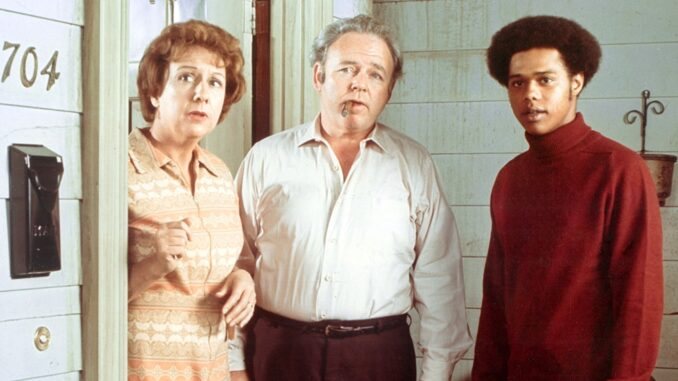
All in the Family was a revolutionary sitcom in the 1970s, boldly addressing race, politics, and class on prime-time TV. Here’s how it transformed the television landscape forever.
The Sitcom That Shocked America: How All in the Family Revolutionized 1970s Television
When All in the Family debuted in 1971, American television was still basking in the glow of wholesome family comedies and sanitized storylines. But this groundbreaking sitcom flipped the script — and the country took notice.
Starring Carroll O’Connor as Archie Bunker, the show unapologetically confronted topics that most networks wouldn’t dare touch: racism, war, sexism, class conflict, and generational divides. It was loud, uncomfortable, and brutally honest — and it became one of the most important shows in TV history.
A New Kind of Comedy for a Changing America
Before All in the Family, sitcoms often portrayed idealized, conflict-free households. But this series, created by Norman Lear, introduced viewers to a blue-collar family in Queens, New York, whose dinner table conversations felt real, raw, and reflective of the times.
Archie Bunker wasn’t a traditional hero. He was a deeply flawed, opinionated, and often offensive man — but viewers saw him as a product of his environment, not just a caricature. His liberal son-in-law Mike, strong-willed daughter Gloria, and sweet but sharp wife Edith helped create authentic generational and ideological conflict that audiences instantly recognized in their own lives.
Tackling Taboo Topics on Prime-Time TV
In the early 1970s, most networks avoided social and political controversy. All in the Family did the opposite — it ran toward it. The show covered:
-
Racial prejudice and bigotry
-
Vietnam War and anti-war sentiments
-
Women’s liberation and gender roles
-
Class tensions and economic struggles
These subjects weren’t handled with after-school-special moralizing — they were woven into sharp, witty, sometimes uncomfortable dialogue that forced viewers to confront their own biases.
Why It Was So Radical — And So Necessary
The genius of All in the Family lay in its ability to balance controversy with humor. It didn’t preach. It didn’t offer perfect answers. But it got people talking — across dinner tables and across the country.
For many Americans, it was the first time they’d heard certain viewpoints or seen their own experiences reflected honestly on screen. For others, it was a wake-up call that social change wasn’t just in the news — it was in their homes.
The show sparked national dialogue and even political backlash, with some praising its bravery and others condemning its content. That kind of cultural impact was unheard of for a sitcom — and that’s exactly what made it revolutionary.
A Lasting Legacy
All in the Family didn’t just influence future comedies — it redefined what a sitcom could be. It inspired spin-offs (Maude, The Jeffersons, Good Times), opened the door for more socially conscious programming, and changed the expectations for TV storytelling.
Its formula — mixing humor with hard truths — still echoes in today’s most daring shows.
Conclusion
All in the Family was more than just a hit TV show. It was a radical act of storytelling that confronted the uncomfortable truths of its time and reshaped the cultural conversation. Over 50 years later, its courage, honesty, and impact remain unmatched in television history.